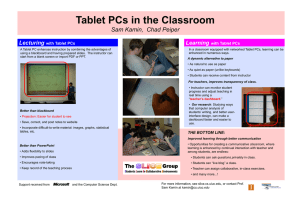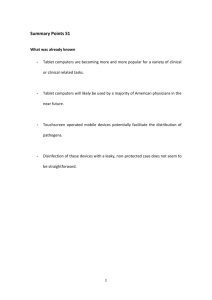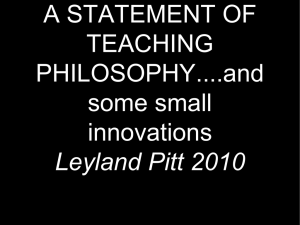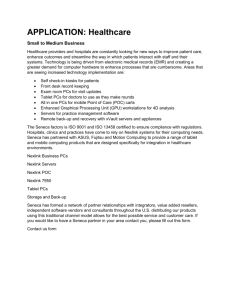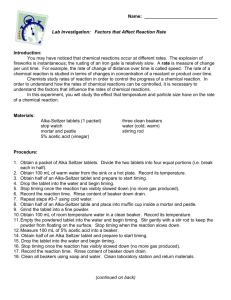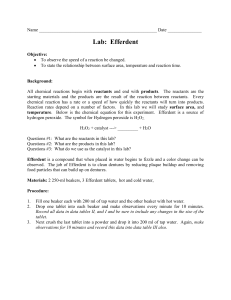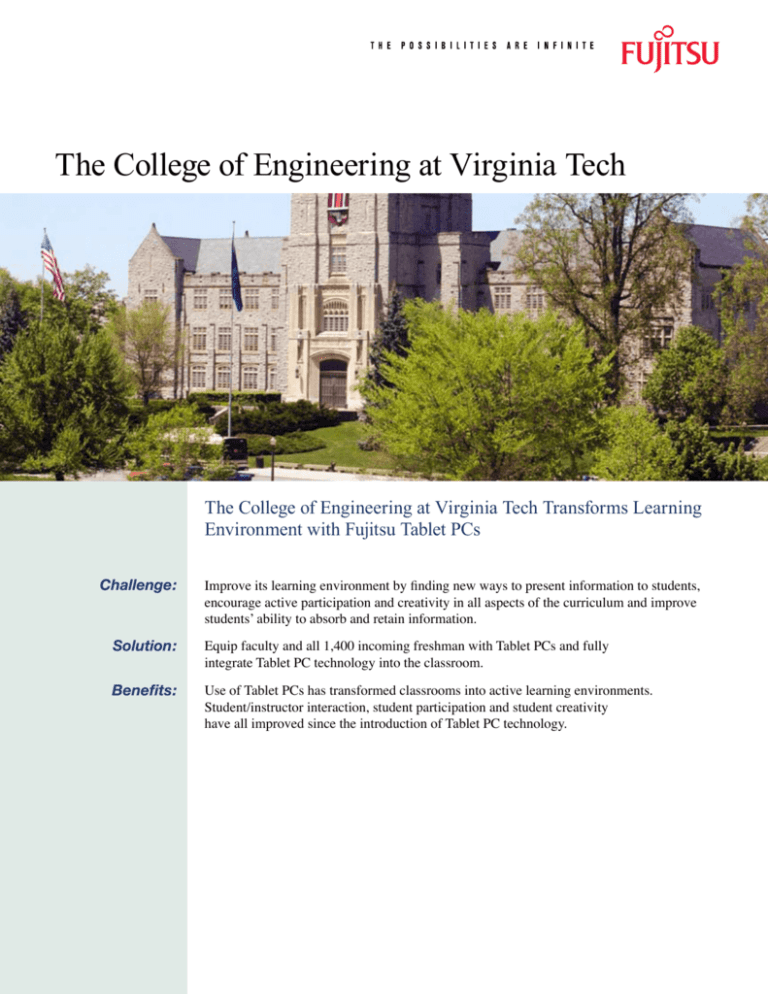
The College of Engineering at Virginia Tech
The College of Engineering at Virginia Tech Transforms Learning
Environment with Fujitsu Tablet PCs
Challenge:
Improve its learning environment by finding new ways to present information to students,
encourage active participation and creativity in all aspects of the curriculum and improve
students’ ability to absorb and retain information.
Solution:
Equip faculty and all 1,400 incoming freshman with Tablet PCs and fully
integrate Tablet PC technology into the classroom.
Benefits:
Use of Tablet PCs has transformed classrooms into active learning environments.
Student/instructor interaction, student participation and student creativity
have all improved since the introduction of Tablet PC technology.
“We selected the Fujitsu LifeBook® Tablet PC
based on its reliability and flexibility, and
Fujitsu’s years of corporate experience with
Tablet PCs. Fujitsu Tablet PCs also provided
the best balance of price, weight, service
and screen size.”
- G
lenda Scales, Associate Dean for Distance
Learning and Computing, College of Engineering
at Virginia Tech
The College of Engineering at Virginia Tech is internationally recognized for its excellence in engineering and
computer science. The college’s 7,000 undergraduate and
graduate students benefit from a combination of innovative,
hands-on courses and state-of-the-art research centers and
laboratories. The College of Engineering is also renowned
for its cutting-edge integration of technology and curriculum. In 1984, the college was the first public institution in
the U.S. to require entering engineering freshmen to own a
personal computer. In 2002, the college moved to a laptop
requirement and many of its academic buildings were outfitted to offer wireless communication capabilities. Now the
college is once again on the technology forefront, becoming
the first and largest public college of engineering to require
all 1,400 incoming freshmen to purchase Tablet PCs. The
college is also working towards equipping all instructors
with Tablet PC technology. The Tablet PC of choice? The
Fujitsu LifeBook T4000 Series convertible Tablet PC.
Creating an Active Learning Environment
College of Engineering at Virginia Tech faculty continuously challenge themselves to improve the college’s learning
environment. To do so, the team researches new ways to
present information to students, encourage active participation and creativity in all aspects of the curriculum, and
improve students’ ability to absorb and retain information.
To facilitate active learning, the College of Engineering
turned to Tablet PC technology. The team felt the Tablet PC
form factor and pen computing capabilities provided many
opportunities for creativity and active learning that were not
provided by a traditional notebook computer.
“We wanted to provide faculty and students with tools to
support active learning and interactivity and saw the Tablet
PC as being a key tool in helping us accomplish this goal,”
explains Glenda Scales, associate dean for distance learning
and computing, College of Engineering at Virginia Tech.
Always the technology innovator, the college also wanted
to help ensure graduating students had the latest technology
skills to give them a head start when they hit the workforce.
Tom Walker, Professor of Engineering Education
at the College of Engineering at Virginia Tech,
prepares lecture using Fujitsu Tablet PC.
After extensive research and a pilot program, the College
of Engineering at Virginia Tech recommended students
purchase the Fujitsu LifeBook T4000 Series convertible
Tablet PC, which combines the convenience and familiarity of a notebook with the versatile functionality of a slate
Tablet PC. In addition, all instructors of first year students
were provided with Fujitsu Tablet PCs to use both inside and
outside the classroom. The college is working with faculty
members to ensure that they have access to a Fujitsu Tablet
PC for teaching. The Fujitsu Tablet PC was chosen for its
flexibility, price, weight, and screen size. Explains Scales,
“We selected the Fujitsu LifeBook Tablet PC based on its
reliability and flexibility, and Fujitsu’s years of corporate
experience with Tablet PCs. Fujitsu Tablet PCs also provided
the best balance of price, weight, service and screen size.”
Reliability was also especially crucial. “We require incoming freshmen students to purchase the Tablet PC that they
will use for the next four years so reliability and durability
are of the utmost importance,” explains Tom Walker,
professor of engineering education at the College of
Engineering at Virginia Tech.
Tablet PCs on Campus
After several months in use, Fujitsu Tablet PCs have
been integrated into the learning environment in
the College of Engineering at Virginia Tech. Faculty
and students are using Tablet PCs on a daily basis
both inside and outside the classroom.
Instructors use Fujitsu Tablet PCs to make their lectures
more interactive and encourage participation in the classroom. For example, a number of instructors are taking
advantage of the portability of the Fujitsu Tablet PC and,
using a wireless projector connection, walk around the classroom with their Tablet PCs, interacting with students. While
instructors display slide presentations as they did with their
notebook computers, the ability to add notes and drawings
or simple arrows and circles to emphasize a point has greatly
increased the level of student attention in the classroom. “I
can’t emphasize enough the advantage of having the ability
to mark on the screen when delivering a presentation or a
demonstration. It’s an exponential improvement in terms of
how the students receive the information and changes the
dynamic of the classroom incredibly,” says Walker.
Many instructors post their presentations and notes on their
websites. Walker, for example, uses an application to record
his voice and everything he presents on his computer screen
during his lecture and posts the resulting video file on his
website so that students can download and review the
lecture and notes again.
The pen computing stylus and digital ink functionality of the
Fujitsu Tablet PC has also proven invaluable in helping instructors introduce students to the countless diagrams, drawings and equations that are integral to engineering study. To
encourage participation, instructors will ask students to get
involved, completing the drawing of a design or solving a
problem on their Tablet PC. The instructor can then project
both correctly and incorrectly completed diagrams and use
the diagrams as powerful, real-time teaching tools.
The pen computing capabilities have also proven to be a
timesaver for faculty who are required to teach using hundreds of diagrams. Instructors create diagrams in advance
of the lecture and use them as a guide that only they can
see during the lectures. Instead of drawing a diagram from
memory, the instructor will use the pen stylus to trace the
existing drawing, while for students it appears that the
instructor is creating the drawing from scratch. Because
instructors no longer have to commit
these diagrams to memory, they are able
to concentrate their time on developing
more interaction during the lectures.
On the other side of the lectern, students
are using Tablet PCs and tools like Microsoft OneNote to take notes during the
class. Because the notes are in electronic
form versus written by hand in a spiral
notebook, students are able to search
and organize information more easily.
“With the Fujitsu Tablet PC, I have
become a much more organized and
effective note taker,” says Dan Rizzo,
a freshman engineering student.
Students are also using the Tablet PCs
to interact with one another and work on
group projects, collaborating on group
sketches and sharing diagrams and notes
with individual mark-ups. “Students
like the way they can share documents
within OneNote and do that frequently
when they are working on team
documents,” says Scales. Rizzo seconds
Scales’s observations. “Using the Fujitsu
Tablet PC and Microsoft OneNote is
the easiest way to take notes and write
papers. When I write papers for English
I just bring my Tablet PC to class, open
up Microsoft Word and have my peers
edit in red right on the document.”
The process of completing, delivering and marking
assignments has also been streamlined for both
students and faculty. Students now have the ability
to complete assignments on their Tablet PCs and
submit them to faculty electronically by email
or over the Internet. Instructors can use their
Tablet PCs to mark and grade the assignments
using digital ink and then deliver them
back to students.
To keep their Fujitsu Tablet PCs and information secure,
many students are taking advantage of the Fingerprint
Sensor security feature. Explains Rizzo, “I love using
the thumb scanner. It makes me feel important like a
business executive. The best part is that it remembers
all of my passwords. If a password prompt comes up,
so does the biometric authentication device, and all
I have to do is scan my thumb.”
Joe Tront, Professor of
Electrical and Computer
Engineering, uses Fujitsu
Tablet PC to teach computer
engineering students.
The Tablet PC form factor
and pen computing
capabilities have provided
faculty and students alike
with a more creative, active
learning environment.
Fujitsu Computer Systems Corporation
Learning with Technology
Enterprise Sales:
1.800.831.3183
us.fujitsu.com/computers
While the Tablet PC project is still in its infancy, faculty are
already seeing improvements in the classroom environment.
Students have been transformed from passive note takers to
more active and engaged participants. Explains Joe Tront,
Professor of Electrical and Computer Engineering, “We can
encourage the ‘what if’ questions that are so important in
engineering education and actually explore those questions
in real-time. The portability and flexibility of the Fujitsu
Tablet PC is enabling us to get students to actively participate
in the learning process, which is fundamental to the active
learning style we are trying to encourage.” Gone is the barrier
between instructor and student and distracting keyboard
typing noise that faculty says was present when students
were using laptops.
Consumer Sales:
1.800.Fujitsu (available 24/7)
www.shopfujitsu.com
Fujitsu, the Fujitsu logo and LifeBook are trademarks
or registered trademarks of Fujitsu Limited in the
United States and other countries. Virginia Tech and
the University Shield are registered trademarks of the
Virginia Polytechnic Institute and State University.
Microsoft and OneNote are trademarks or registered
trademarks of Microsoft Corporation in the United
States and other countries. All other trademarks
are the property of their respective owners.
© 2006 Fujitsu Computer Systems Corporation.
All rights reserved.
FPC58-1660-01
In addition, because instructors can make their presentations, written notes and diagrams from class sessions available online, students are able to fully immerse themselves
in the lecture, instead of frantically trying to take notes.
“Because both students and instructors are using Tablet PCs,
students can spend time looking at what I’m doing, listening
and asking questions versus
feverishly taking notes. In
the end, the student is more
active and participatory,
which improves learning,”
says Walker.
The College of Engineering faculty who teach first
year students believe that
Tablet PCs are enabling both
students and faculty to be
more creative. “We want
to encourage our students
to be creative but felt they
were being hampered by
the standard computer and
keyboard. With the Tablet
PC and stylus, students can
work freely, without the
creative limitations found
in a traditional computer,”
explains Walker. In a field that is dedicated to finding
creative solutions to problems, that is no small
accomplishment. In addition, because the Fujitsu
Tablet PC is a convertible Tablet PC, students can
also use a keyboard like a standard notebook computer
when needed, making it an ideal solution for all of
their needs. The introduction of Tablet PCs has been
such a success at the freshman level that the next
phase of the project is to work closely with faculty
from other departments to integrate the use of
Tablet PCs into upper level courses as well.
By introducing students to Tablet PC technology in
their first year, the college is also providing students
with industry leading technology experience not
matched at many other educational institutions.
“We try to stress to our students that these are
tools for their future success. Once they leave
Virginia Tech, technology like the Fujitsu Tablet PC
is going to give them a valuable leg up on
the competition,” concludes Walker.
An engineering student
uses Fujitsu Tablet PC to
take notes in class. Because
the notes are in electronic
form versus written by
hand in a spiral notebook,
students are able to search
and organize information
more easily.

